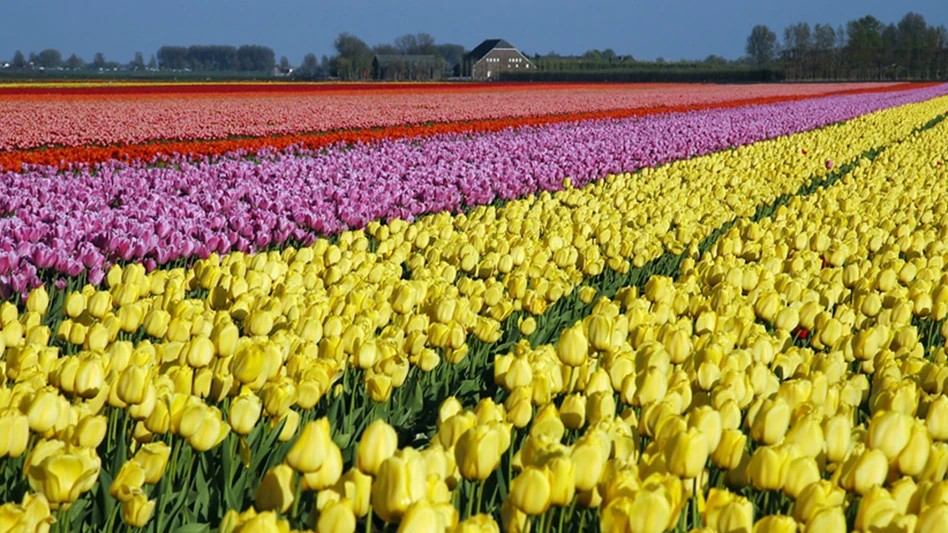
The family behind the business: (front row) Linda O'Keeffee, Leslie
Logan, Julie Logan; (back row) Joshua Logan, Robert Logan Jr.
“Sustainability” is a term that’s tossed about so lightly these days, it has practically lost its true meaning: To meet the needs of the present without compromising the ability of future generations to meet their own needs.
Logan’s in Raleigh, N.C., embodies authentic sustainability. They’re helping customers make eco-friendly choices. They’re working to conserve resources. But they’re going beyond that. The entire Logan family is committed to giving back to their community in a meaningful way. Logan’s desire to be truly sustainable is what earned the company one of Garden Center magazine’s Innovator awards.
Location, reinvented. Logan’s store location is the largest physical manifestation of the business’s sustainability efforts. In 1991, Robert Logan Jr. moved the business from its original location at the farmer’s market to the old Seaboard Railroad station.
“When we purchased it, it was actually empty and quite run down,” said Leslie Logan, Robert’s daughter and the store’s administration/marketing coordinator. “But I guess my dad had a vision. The store really turned around the whole neighborhood. He had a vision that downtown Raleigh could be restored. The area has turned completely around in the last five years. It’s been a blessing to watch his dream come to life.”
The store itself maintains many elements from the site’s railroad days. The covered platforms are now used to shelter plant material. The station’s lunch counter is now home to the Seaboard Café, a popular destination for both garden center shoppers and downtown regulars.
“I think we’re privileged as a business to have a facility with such a rich history,” said Joshua Logan, Robert’s son and general manager of the store. “Customers will tell me coming here brings back a lot of good memories and they’re glad we kept the facility basically in its original condition.”
Joshua and the entire team at Logan’s are committed to being good stewards of the old station and the neighborhood at large. This year, they’re serving as a collection site for “Plant a Row for the Hungry.” Gardeners can bring surplus produce from their vegetable patches to Logan’s, which is serving as a collection site for a local food bank.
In the very near future, Joshua hopes they can persuade the local housing authority to set aside some land at nearby public housing complexes for a community garden. Logan’s staff members will be heavily involved in this effort to share the joy of gardening with people in the inner city.
“As businesses invest in the community, they invest in greater loyalty in that business,” Joshua said. “…Living in the [state] capitol, there’s no better place to demonstrate to lawmakers how businesses can partner with the community to make a positive impact—to create things so that the communities aren’t entirely dependent on government for programs that benefit the area.”
Conservation efforts. Just last year Raleigh, N.C., was crippled by drought—a situation that brought most garden-retail businesses to a screeching halt. Thankfully, Logan’s managed to survive this devastating turn of events by carefully using water and encouraging customers to do the same.
Since Logan’s is in the heart of the city, the store is dependent upon municipal water. The garden center initially started collecting and reusing rainwater to keep the water bill down. When the drought hit, Logan’s quickly decided to extended this strategy and become an education source for rainwater collection and shopping destination for rain barrels.
The drought has abated, but Logan’s maintains its commitment to sustainable water use. Joshua said they’re working on plans to create a living marsh at the back of their property that will be used as a water filtration and recapture system. The plan would keep runoff out of storm water drains and allow them to cut down the amount of municipal water they use to irrigate plant stock.
“I see this as an opportunity to partner with the university and allow them to use the system to learn about water filtration and recapture,” Joshua said. “If we can make it work at Logan’s it’ll be a benefit for both the company and the city.”
Eco-friendly, not eco-pushy. Like most garden centers that pride themselves on sustainability, Logan’s offers a rich selection of organic gardening products.
“We have the biggest selection in central North Carolina that I know of,” Joshua said. “Our staff committed to it long before it was in vogue. The community has just come to the point in the last five years where they’ll really listen [to organic messages].”
Consequently, the store’s ratio of organic and conventional garden offerings has shifted. Logan’s now has about 20 linear feet devoted to organics and 10-12 linear feet devoted to conventional products.
“We have folks who are really committed to organics and folks who have used conventional their entire life,” Joshua said. “We value both customers. Then there’s a huge group in the middle who don’t know, or they’re open. They’re the largest section of our customers.”
Consumers who are undecided about which gardening methods to use can learn a lot from Logan’s display gardens. The raised beds are made from repurposed materials—namely cinder blocks that were used to build up old plant benches. Joshua said it was a great way to show customers how they can get into gardening without spending a lot of money.
It was also an excellent demonstration of organic gardening methods. The beds were filled with an organic soil mix and a little greensand. No other remedies or inputs were required. It gave customers confidence to see a garden that didn’t have to be “babied along,” Joshua said. And it did a lot for “demystifying the process.”
Reviving a dying breed. Logan’s is also a fine example of an effort to sustain an endangered species: the family-owned and operated business. Leslie Logan speaks proudly of her grandfather and father’s efforts to build the business. Any credit for Logan’s success should sit squarely on their shoulders, according to Leslie. But a lot of the momentum the business has generated in recent years can be attributed to her brother, Joshua. When he decided to return to the business, “It was almost like breathing new life into the company and into my father,” Leslie said.
Joshua and his father now make a point to visit other garden centers and gather new ideas. They’re taking a new approach to marketing and experimenting with online shopping capabilities. Together, they’ve created an entirely new frame of reference for the store.
“With all that being said, they’ve done a great job of marrying generations,” Leslie said. “They’re keeping the old-school style family atmosphere while still appealing to downtown, condo-dwelling people.”
Joshua is both invigorated and humbled by the reputation Logan’s has created. He’s determined to see it passed down to future generations.
“The family business is slowly dying in our community,” he said. “I feel like I’m one of the luckiest people around. I’m getting this direct inheritance of my family’s heritage. It’s just a rare thing these days. And that’s something that I really, really value.”

Explore the June 2009 Issue
Check out more from this issue and find your next story to read.
Latest from Garden Center
- Weekend Reading 1/24/25
- How garden centers can leverage plants in floral design
- Hoffman Nursery announces David Hoffman as CEO, Craig Reynolds as COO
- Magic & mystique
- National Garden Bureau announces 2025 Green Thumb Award winners
- Applications now open for American Floral Endowment graduate scholarships
- Weekend Reading 1/17/25
- A nation of gardeners





